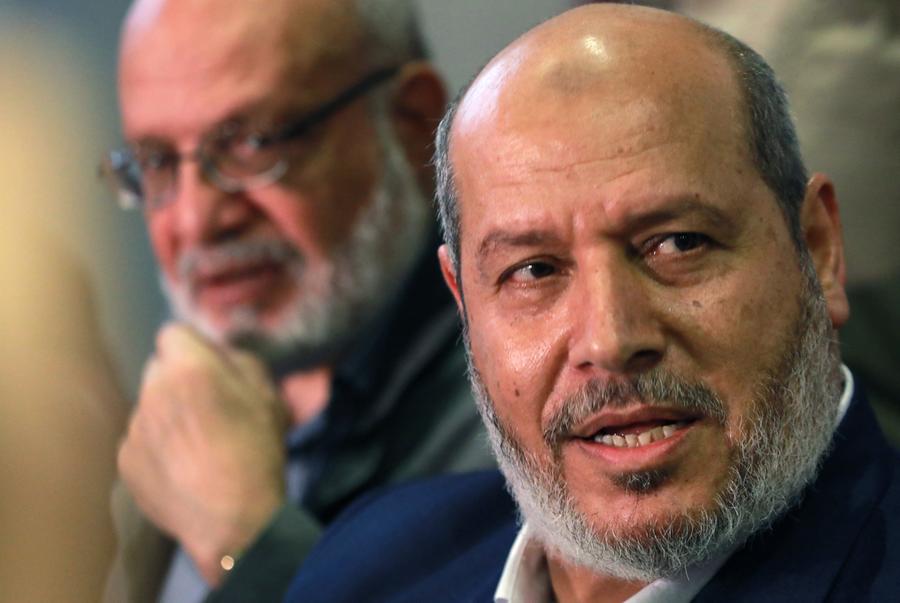Top Stories
Hamas Refuses Disarmament Without Ending ‘Occupation’, Al-Hayya Says

URGENT UPDATE: Khalil al-Hayya, acting co-chair of Hamas’ political bureau, has just declared that the group will only disarm if the “occupation” ends, directly contradicting the framework of the US-backed peace deal. This announcement, made during an interview with Al Jazeera, raises critical questions about the future of peace negotiations.
Al-Hayya’s remarks come amidst ongoing talks where the Trump plan stipulates that Hamas would disarm after the last hostages are returned, with the Israel Defense Forces (IDF) withdrawing from Gaza only after this process is completed. However, al-Hayya’s insistence that disarmament is “linked to the presence of the occupation and aggression” complicates the situation significantly.
The definition of “occupation” remains contentious, as Hamas leaders often view the very existence of Israel as a form of occupation. Al-Hayya further revealed that Hamas has reached a tentative agreement with rival Palestinian factions, including Fatah, to form a technocratic governing committee to manage Gaza. Yet, he did not provide a timeline or details on Hamas’s role in this committee, despite both Israel and the US insisting that Hamas cannot participate in Gaza’s governance.
Adding to the complexity, Fatah has dismissed the idea of such a committee, asserting that the Palestinian Liberation Organization (PLO) remains the sole authority for governing both the West Bank and Gaza. This contradiction underscores the fragmented nature of Palestinian leadership amidst the ongoing conflict.
Meanwhile, Jordan’s King Abdullah has raised concerns regarding the proposed International Stabilisation Force (ISF), a neutral peacekeeping force included in the Trump plan. In a separate interview with the BBC, he questioned the feasibility of enforcing peace in Gaza through this force. Abdullah stated, “What is the mandate of security forces inside Gaza?” He emphasized that peacekeeping is acceptable, but peace enforcement would deter international involvement.
Countries like Indonesia, Pakistan, and Azerbaijan are expected to contribute troops to the ISF. However, Israel insists on maintaining veto power over troop contributions, particularly regarding Turkish involvement, which Prime Minister Netanyahu perceives as a “red line.”
King Abdullah added, “If we’re running around Gaza on patrol with weapons, that’s not a situation that any country would like to get involved in.” His comments reflect a growing concern over the stability of the region and the effectiveness of international peacekeeping efforts.
As these developments unfold, the future of Gaza remains uncertain. Key stakeholders are urged to closely monitor the situation. The implications of these statements could have far-reaching effects on peace negotiations in the region, making it crucial to stay updated on further announcements.
For more immediate updates and in-depth analysis on the Israel-Palestine conflict, subscribe to our free Israel Briefing newsletter.
-

 World2 weeks ago
World2 weeks agoGlobal Air Forces Ranked by Annual Defense Budgets in 2025
-

 World2 weeks ago
World2 weeks agoMass Production of F-35 Fighter Jet Drives Down Costs
-

 Top Stories2 weeks ago
Top Stories2 weeks agoNew ‘Star Trek: Voyager’ Game Demo Released, Players Test Limits
-

 Top Stories2 weeks ago
Top Stories2 weeks agoDirecTV to Launch AI-Driven Ads with User Likenesses in 2026
-

 Science2 weeks ago
Science2 weeks agoTime Crystals Revolutionize Quantum Computing Potential
-

 Lifestyle2 weeks ago
Lifestyle2 weeks agoLia Thomas Honored with ‘Voice of Inspiration’ Award at Dodgers Event
-

 Entertainment2 weeks ago
Entertainment2 weeks agoFreeport Art Gallery Transforms Waste into Creative Masterpieces
-

 Lifestyle1 week ago
Lifestyle1 week agoDiscover Reese Witherspoon’s Chic Dining Room Style for Under $25
-

 World2 weeks ago
World2 weeks agoElectrification Challenges Demand Advanced Multiphysics Modeling
-

 Health1 week ago
Health1 week agoGavin Newsom Critiques Trump’s Health and National Guard Plans
-

 Entertainment2 weeks ago
Entertainment2 weeks agoFast & Furious Coaster Hits the Track at Universal Studios
-

 Health2 weeks ago
Health2 weeks agoResearchers Uncover New Insights into Cancer Mortality Causes









